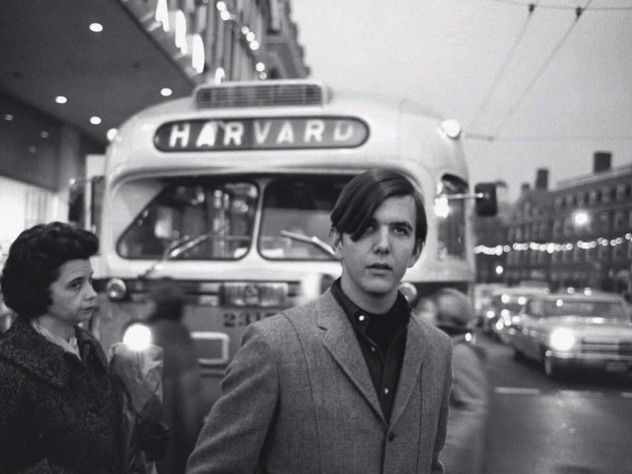Behind the Scenes: Writing what only I can write
THERE’S A QUOTE MY FORMER WRITING PROFESSOR LOVES, from Isaac Bashevis Singer: “I only write what only I can write.” I keep that quote on a sticky note near my desk. Of course, as a journalist, I don’t always get to choose exactly which topics I write about, but my recent feature about Gram Parsons felt like a fortunate instance in which I could write what only I can write.
I’d heard the story of Gram Parsons long before I wrote about him in Harvard Magazine. I’d heard the story of Gram Parsons before I even knew how to write.
I grew up in my family’s Los Angeles music store, Westwood Music. My father, Fred, was the face of the shop, selling pre-WWII Martin guitars to musicians he’d known since the days of Woodstock; my mother, Kathy, was the brain, crunching numbers in the office next to the noisy instrument repair studio; and my brother and I were the vermin of the store, reading Tales from the Crypt in our guitar-storage-loft fort and taking inventory with tally marks. I heard about Gram Parsons throughout that childhood—usually as my father’s long-dead buddy who made great music, sometimes as the man whose corpse was cremated in Joshua Tree by his road manager, and other times, as a complicated person with a complicated legacy.
I knew one of my advantages in reporting this piece was that I personally knew some of the sources for the story. However, I was also aware that, as a 25-year-old, I had a limited idea of what life was like when Parsons was alive. I tried to learn more by asking each of my interview subjects questions about the spirit of the time, and I also went back to the archives to flesh out my understanding. Combing through University Archive copies of The Crimson and The Yardling, I read about student protests and dances with “the Cliffies,” and reviewed advertisements for record stores, hair gel, and suit shops to try to understand the zeitgeist.
One of this article’s biggest challenges was that so much has already been written about Parsons. To tell you the truth, there is currently a waist-high stack of books in my house about Gram Parsons that I checked out of the Harvard Library. Hoping to add something to the Parsons historiography about his time at Harvard, I spoke with Gram’s proctor, the Rev. Dr. Jet Thomas. Besides being Gram’s mentor during his life, he is now a true friend and companion to many other musicians from that era. He is a wonderful, insightful person, and meeting him remains a highlight of my reporting experience. (And seeing pictures of his adorable puppy, Poco!)
From there, my reporting journey took me to a long-distance Zoom call with Ian Dunlop, Parsons’s former bandmate he met in Cambridge. Dunlop lives on a farm in the English countryside, where he’s been for decades. Gram even visited the farm in 1971, living in the cottage across the street and helping Dunlop fix an old mill. Dunlop alerted me to a side of Gram that few people include their biographies: the “Boy Scout Gram” who loved to be outdoors. Often, that side of him is lost in retellings that focus more on his addiction problems.
I’m also indebted to the Harvard-Radcliffe Class of 1969 for graciously responding to my call for stories of the undergraduate Gram Parsons or the 1960s Cambridge music scene. Benjamin Levy included my request for interviews in the Class’s monthly email, and many Harvardians sent me remembrances of Parsons and fun stories from their own time as undergraduates.
Harvard Magazine is the only place where I could write a feature like this. I have the pleasure of working with an editor-in-chief who allowed me to run with a feature about a long-dead musician who only went to Harvard for a semester. It’s not often one gets that kind of support and trust. It’s also a gift to have the University libraries and archives just a short walk from my office on Ware Street. (One of the best parts of reporting this piece was chatting with all the helpful librarians and archivists!) I’m also privileged to work with some of my favorite writers and editors, who patiently listened to me talk about Gram Parsons for the past year.
Thanks to Harvard Magazine and its donors, I had the unbelievable fortune to “only write what only I can write.”
